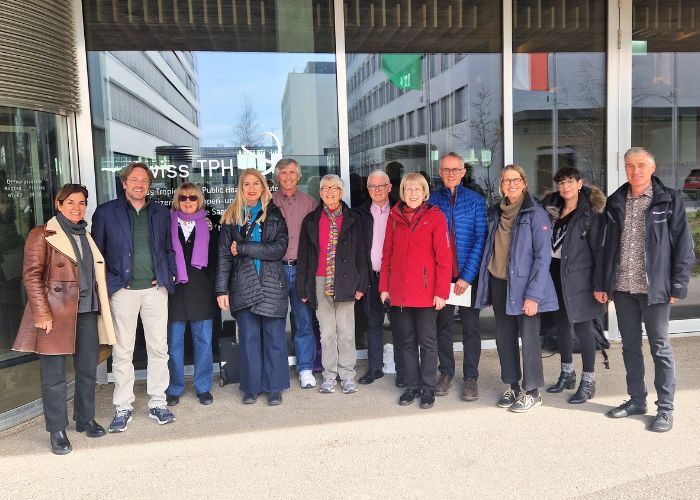Originally conceived to be an architectural tour of the Swiss Innovation Park / Basel-Link life sciences cluster and surroundings, The Cornell Club of Switzerland event evolved to be much more than that. The focus of the day shifted to visiting the Swiss Tropical and Public Health Institute (Swiss TPH), which moved there to its new headquarters “Belo Horizonte” in 2022. The multi-functional building, designed by Basel-based architects Kunz and Moesch, won the public’s prize in an architectural competition that takes place every five years. Prior to the move, the staff and students of the Swiss TPH were spread over seven buildings in the center of Basel. All, apart from the Centre for Tropical and Travel Medicine, are now working under one roof.


The Swiss Tropical Institute was founded 80 years ago in Basel. Since then, it has grown continuously and in 2009 became known as the Swiss Tropical and Public Health Institute (Swiss TPH). Today, the Swiss TPH is active in 120 countries with 950 staff and students. Its mission has remained the same since 1943: to improve the health of people worldwide. The Swiss TPH is an associate institute of the University of Basel.


Fourteen of us from the Cornell Club of Switzerland met for our event on
March 9th, 2024. Cornell Alumna, Lisa Crump, hosted our group at the Swiss TPH.
Lisa introduced us to the Swiss TPH as a whole and then presented in more detail the research that she, as a veterinary epidemiologist, and her colleagues perform and how they apply this towards making the world a healthier place.

Lisa explained the concept of “One Health”, a multidisciplinary approach that recognizes that there are inextricable linkages between human, livestock, companion animal, and wildlife health and their ecosystems. It focuses on the interface where disease transmission occurs and explicitly incorporates underlying social and environmental factors. Lisa provided examples of how this multidisciplinary approach has been successfully applied to providing vaccines to the children of itinerant populations and controlling the spread of rabies using different approaches based on a population’s relationship to dogs.


After learning about the Swiss TPH and some of the work that her department does, Lisa gave us a tour of the building itself.
The facility comprises offices, laboratories, and social spaces in a bright, pleasant environment.
The lobby and cafeteria are open to the public during working hours. It is well worth a visit.

Alumni Jean Carol and Lisa Crump (see photo) were initiators and organizers of the event. Jean arranged for lunch at a nearby restaurant. This was followed by a walking tour led by Jean.

In the 1990s the Allschwil-Bachgraben area comprised an industrial park, family gardens, and farmland. In the meantime, it has transformed into an internationally recognized hotspot for research and development in biotechnology, health care, public health, digital health, and other areas of the life sciences. It is now known as the Life Science Cluster, Basel Link, and Swiss Innovation Park. It is home to numerous companies and research institutions including Basel Launch, Swiss Tropical and Public Health Institute, Basilea, Johnson & Johnson, Abbott, Idorsia, Polyphor, Merz Pharma, and the Basel University Biomedical Engineering Department.
The climate of innovation and networking is expressed in contemporary concepts (sustainability, employee relations) and futuristic buildings.
The newest project is HORTUS, designed and being built for sustainability. The name derives from the Latin word for garden. It is also an acronym: House of Research, Technology, Utopia, and Sustainability. Examples of sustainability: the HORTUS structure consists of wood, where possible from local forests. There is no cellar because a cellar requires concrete. Loam from the construction site is also being used. And for heat insulation, old paper.

